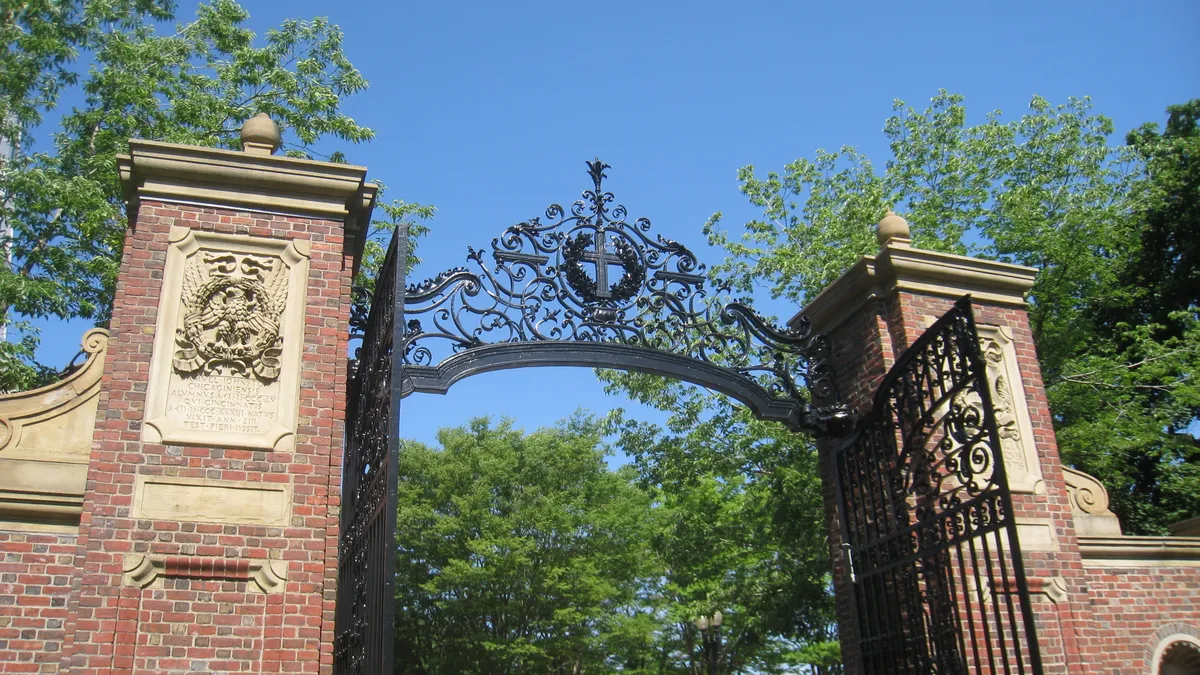News that Harvard University expects to pay almost $50 million in new federal taxes as a result of the sweeping tax reform package that Congress passed in 2017 may not come as a surprise. Its endowment, $40.9 billion, is the largest in the U.S.
But it's no small change, either. As such, Harvard officials and others representing affluent private institutions are pushing back on the new law and are lobbying for exemption. They argue that the fees will cut into critical spending on academics and financial aid.
The U.S. Treasury Department published proposed rules in July for how the bill would affect colleges and universities. Harvard's estimate, which was made public last week in the university's annual fiscal report, is based on that draft.
What does the tax cover?
The tax reform law, long considered a big win for the Trump administration, imposes a so-called "endowment tax," a 1.4% excise tax on net investment income at private colleges and universities that enroll at least 500 tuition-paying students and have assets of at least $500,000 per student.
The change means to treat university endowments the same as private foundations that are similarly taxed. Such foundations were already taxed prior to the 2017 law passing.
These colleges would be taxed on interest, dividends and rental income, meaning the money they earn from students living on campus would also be taxed.
Only a narrow band of colleges — between 25 and 40 institutions — would be subject to the tax, according to media reports, but it has still generated significant blowback.
Susan Whealler Johnston, president and CEO of the National Association of College and University Business Officers wrote to Treasury Department representatives in September, calling the tax "an unprecedented and damaging attack on the tax-exempt status" of institutions.
It "will diminish" charitable funds for academic support, financial aid, innovation, public service and research, she wrote. "As public charities and educational entities, colleges and universities dedicate their efforts and resources to the public good through education and scholarship."
How is Harvard affected?
Harvard estimates the tax law cost it $49.8 million in additional taxes for the 2019 fiscal year, according to its report. This is about 1% of its total annual revenue. Its operating revenue for the year was about $5.5 billion.
Administrators estimated that a little less than $38 million is being assessed on its endowment. The remainder of the new tax bill, $12.1 million, comes from net investments on the college's operational revenues, unrelated business taxable income and excise taxes on executive compensation.
Harvard President Lawrence Bacow indicated in the report that the tax law was one factor that could curtail the university's economic prosperity. Uncertainty in research funding is another potential threat, he wrote.
"Our challenge is to acknowledge these realities, advocate for policies and laws that will support our mission and continue to manage our finances prudently and thoughtfully so that we can make the investments in students, faculty, teaching and research that make a positive and lasting impact in the world," Bacow wrote.
The university declined further comment to Education Dive.
Other colleges push back
Harvard is one of more than 30 colleges and universities that wrote to U.S. Treasury Secretary Steven Mnuchin this month detailing their opposition to the draft tax rules. Among their complaints, officials objected to the department's definition of "student," which is broader than that outlined in the Higher Education Act, the federal law governing college and university aid.
Some colleges have submitted their own complaints to the department.
Berea College, a liberal arts institution in Kentucky that is known for its system in which students work in lieu of paying tuition, wrote to the department to argue that it should be exempted because its financial model is far more reliant on its endowment than traditional universities.
Senate Majority Leader Mitch McConnell, a Republican, sought to have Berea — located in his home state — shielded from the law's effects.
For now, the Treasury Department's guidelines include Berea because even students whose tuition is paid for by a third party (in this case, the college) are counted in the agency's calculations. College officials believe the tax will cost Berea $1 million a year. Its endowment is approximately $1.2 billion.
"Any tax burden on this endowment is a direct impediment to Berea's mission and a disservice to our students who cannot afford to pay for college," college officials wrote.

















